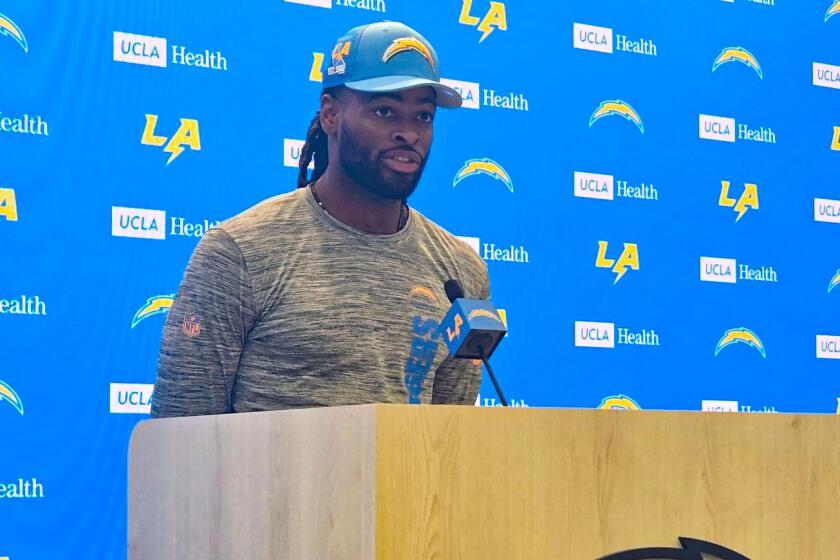Networking the Ballparks : ABC AND NBC TAKE SEPARATE TURNS AT BAT TO DRIVE HOME REGULAR AND POST-SEASON PLAY
- Share via
After years of declining ratings, missing endorsements and collapsing TV revenues for major league baseball, nearly everyone agreed that the game needed some kind of revolution.
Well, let the revolution begin.
Its prelude bows Tuesday with the broadcast of the All-Star game at Pittsburgh’s Three Rivers Stadium when the “baseball network” will be unveiled for a curious public--and an equally curious nest of sponsors.
In a radical switch from the past weekly Saturday daytime broadcasts (most recently handled by CBS), this joint venture of Major League Baseball with ABC and NBC will cover the second half of the season on a single weekly prime-time night dubbed “Baseball Night in America.”
ABC will air the first six regular season game nights beginning July 16, while NBC will air the remaining six nights starting Aug. 26. ABC will carry both the divisional playoffs starting Oct. 4 (expanded this year with divisional realignment and wild card teams) and the World Series, which begins Oct. 22. NBC’s post-season job is to carry the American and National League championship series, which begins Oct. 11.
When the baseball network president Ken Schanzer claims that the weeknight broadcasts will be “truly Olympian” in scale, he’s not using hyperbole. “Look at a typical day during the Olympics,” he says by phone from his New York office. “The most venues a network will handle is 9 or 10. We will have broadcast teams at 14 games. Rather than seeing a game of the week, we will be seeing a night of the week.”
The ambitious plan involves posting a primary play-by-play unit (ABC’s is Al Michaels with Tim McCarver and Jim Palmer; NBC’s is Bob Costas with Bob Uecker) at a key game, with regional games handled by 13 other units often including locally based play-by-play announcers and analysts. Each region will see both the “local” game, and when action heats up elsewhere, any of the other 13 games.
And in another Olympian gesture, Greg Gumbel, who anchored CBS’ Winter Olympics show, will do similar chores for the new “network.”
Think of “Baseball Night in America” as attempting to snare some of the event status of the NFL on Sunday TV, only on one station.
It’s also attempting to snare some momentum, which had been severely lost in recent years with CBS’ disastrous broadcasting venture. The network lost nearly $600 million during its four-year, $1.06 billion deal with Major League Baseball.
The networks realized that they had overpaid for broadcast rights in the past. Thus, the notion of a joint venture between baseball and ABC and NBC emerged as a solution.
Even before spring training, Madison Avenue skeptics doubted it could reach its stated goal of $180 million in ad sales. But with 21 sponsors lined up, the goal has virtually been met.
Schanzer hopes that sponsors will highlight stars, and cites sponsor Kellogg, which features Seattle Mariners slugger Ken Griffey Jr. With the Dodgers’ Mike Piazza, the Chicago White Sox’s Frank Thomas and the San Francisco Giants’ Barry Bonds leading the endorsement way, Schanzer sees the linkages between stars, games and commercials as fueling the kind of TV fan upsurge enjoyed by the NBA in the 1980s.
Still, says Costas, “This is a show that will be very tricky to pull off. I’m enough of a purist to say that a simultaneous 14-game coverage isn’t the classical way to televise the game. You won’t see the game from start to finish. But as an added, once-weekly way of seeing both leagues in action, this can be real spice compared to the glut of daily baseball on the cable and local channels.”
“I’m as curious as anybody to see how this works,” Michaels says. “You’ll see your base game in your region, and then, after a while, who knows what you’ll see. If Greg Maddux is pitching a no-hitter for the (Atlanta) Braves, or Griffey is going after the home-run record, we’ll cut away to that.”
In a sign of his heavyweight status as one of TV’s leading sports voices, Costas feels free to criticize the new network’s post-season coverage. Since all games will air at night (unlike in past years, when games were played day and night), fans won’t be able to watch all of the crucial match-ups. “I have real problems with that,” Costas says, “and with splitting up the coverage regionally. The Braves’ playoff game, say, will air in Florida. But where does that leave the transplanted New Yorkers who live there?”
Schanzer understands the problems, but insists that poor ratings for day playoff games demanded night broadcasts. The most immediate problem, facing the new broadcast team, though, is the prospect of ballplayers on strike, smack in the middle of the weeks the network plans to broadcast.
The “ baseball network “ premieres at 5 p.m. Tuesday on NBC with the All-Star Game.
More to Read
Go beyond the scoreboard
Get the latest on L.A.'s teams in the daily Sports Report newsletter.
You may occasionally receive promotional content from the Los Angeles Times.










